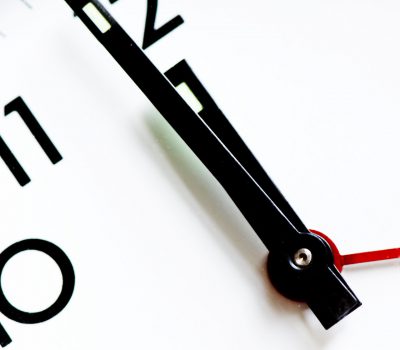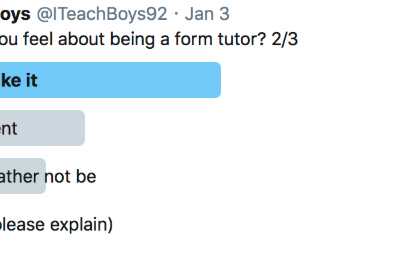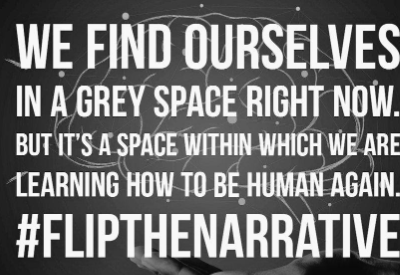


Our team sorts through all blog submissions to place them in the categories they fit the most - meaning it's never been simpler to gain advice and new knowledge for topics most important for you. This is why we have created this straight-forward guide to help you navigate our system.


And there you have it! Now your collection of blogs are catered to your chosen topics and are ready for you to explore. Plus, if you frequently return to the same categories you can bookmark your current URL and we will save your choices on return. Happy Reading!
The Gargantuan Tasks Asked of Teachers
Teachers are faced with an impossible task, teach the curriculum and fit everything in but at the same time shape outspoken and independent individuals. Charlotte Marshall explores this paradox.

Each teacher is faced with the gargantuan task of preparing the next generation; but they are doing it blindfolded. What exactly are teachers preparing students for? Teachers don’t know what the workforce will need, we don’t know what the problems will be, teachers don’t have the answers because the questions haven’t been asked yet. Teachers are to complete that impossible task under difficult circumstances, without the resources, with everybody seemingly waiting to blame them for something. Blamed for anything – from the bad manners of a generation to a lack of empathy and as far as a low cultural capital. It’s relentless.
Gemma Corby (2019) quite rightly said that “Being a compliant drone is not an asset in today’s world.” Rather we need brave, confident, outspoken youngsters to take the next step of social change; can they just wait until they have finished in our classrooms though? Right now, I need the ‘perfect’ student, the well-behaved student, the dutiful and respectful student because there is too much content to get through. Be brave, be different, be inspiring, just don’t do it yet. The candidates most desirable are the ones that can think outside of the box, those that have skills to approach tasks in inventive ways but can we assume that those skills will be developed in a classroom setting that asks for a standardised set of behaviour from each person. Sit quietly, wait to be called upon, speak concisely and clearly. That’s all wonderful but it doesn’t breed original thinking. Teachers are to prepare the minds of today for the work of tomorrow whilst upholding the values of yesterday. Can we really have it all?
Worse still teachers are often the products of the system they work in and not by their own doing. Teachers are required to be a cocktail of contradictions; behave impeccably whilst being creative, produce excellent outcomes whilst taking risks, role model tolerance whilst challenging prejudice. As a teacher, I want to raise warriors prepared to fight and defend their rights but I often feel as though I put students on standby so that we can just finish this last bit of the curriculum. For the sake of classroom management, for the benefit of clarity, for the sake of order please be passive. For the sake of change, for the sake of the community, for the sake of social progress please be rebellious. Is it any wonder that people leave the profession – the job feels too difficult.
Why is it that we are encouraging newness of thinking but modelling sameness in our classrooms? All students quietly annotating a core text, asking appropriate questions and making detailed notes sounds idyllic. It would be easy to manage, easy to show progress and I would be sure to get the label of ‘outstanding’, a nice pat on the back and the recognition of all of my peers. Is that what it is about? It assumes that the ‘easy’ experence in the classroom is the most important one. It assumes that the quiet assimilation of knowledge is best practice. What we actually need is a little bit of chaos, especially if we hope to complete the gargantuan.
To best prepare our students, we need them to go back to their four-year-old selves and ask ‘why’. Repetitively. Annoyingly. Exasperatingly. Why are we studying this book? Why do I need this theory? Why am I to be quiet? The more they ask ‘why’ the closer they get to the critical consciousness coined by Freire. The more they will understand the processes they are a part of and the more they will find the reasons that something doesn’t work, the more prepared they will be for the unknown.
Perhaps we can follow suit too. Why is this paperwork necessary? Why do I need another CPD session on ‘aims’? Why do I fill up so much of my time on admin? This is not to be contradictory or to refuse to work, it is to be better prepared and thus better prepare those that follow. The answers to the ‘why’ questions don’t have to incite rebellion. The rebellion is in the asking.
Reading List:
Gemma Corby Tes No 5382 (27/12/19) Six Toxic Messages We Are Sending out to Students pg. 10

The author

Read more

Read more

Read more

Read more

Read more

Read more

Read more

Read more


Are you looking for solutions? Let us help fund them! Nexus Education is a community of over 11,000 schools that come together to share best practise, ideas and CPD via online channels and free to attend events. Nexus also offers funding to all school groups in the UK via nexus-education.com


Established in 2011, One Education is a company at the heart of the education world, supporting over 600 schools and academies. Our unique appeal as a provider is in the breadth and synergy of the services we offer, supporting school leaders, teachers and support staff to achieve the best possible outcomes for their pupils and staff.

School Space is a social enterprise that has empowered schools for over 12 years through their profitable and hassle-free lettings services. So far, they’ve generated over £5 million in revenue for education, helping to connect over 200 schools with their local communities.


Unify is an online sales and marketing tool that allows users to create tailored personalised documents in moments.


There’s nothing special about the energy we sell. In fact, it’s exactly the same energy as all our competitors provide. But there is something special about the way we do it. Where others complicate the process, we simplify it. Where others confuse customers with hidden terms, we’re an open book. And where others do all they can to make as much money from their customers as possible, we do all we can to make as little. Everything we do, we do it differently. Our customers are a privilege. One we’ll never take advantage of.


Securus provide market-leading monitoring solutions to safeguard students on ALL devices both online and offline. We also offer a full monitoring service, where we carry out the monitoring on behalf of the school, freeing up valuable staff resources. From the smallest school to large MAT groups, Securus offers safeguarding protection for all!


Bodet Time offers dedicated solutions to education through lockdown alerts, class change systems, PA and synchronised clock systems. Improving time efficiency of the working and school day; ensuring safety through lockdown alerts; increasing communication with customised broadcast alerts.


Robotical makes Marty the Robot - a walking, dancing coding robot that makes programming fun and engaging for learners as young as 5. Our robots come with a full Learning Platform that has complete teaching resources, to make lesson planning a breeze.